During
September 5 to 8, 1865 Gunn & Amidon
participated in the
Second Annual Exhibition organized by
the New England Agricultural Society in Concord,
NH.
They
presented two products - a wringer and a bit brace and
receive recognition in a form of diploma.
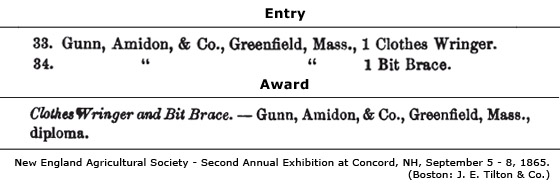
It is not
clear if the brace shown there was Barber's brace or a
new, Amidon's design. It would seem logical that
new brace of Amidon design was presented.
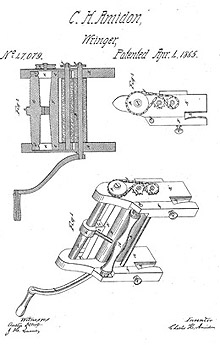 The
success of braces did not stop Amidon from
continuing improvements to his wringer. In August, 1865
he received another patent, No. 47,079, for Improvement
in Wringing-Machine.
The
success of braces did not stop Amidon from
continuing improvements to his wringer. In August, 1865
he received another patent, No. 47,079, for Improvement
in Wringing-Machine.
In the patent
description Amidon said: "Wringing or washing
machines are generally constructed with a bearings of
one roller placed in movable boxes, which are free to
rise and fall as the thick or thin body passes between
the rollers. Some are constructed with two cog-wheels,
one of which is attached to the end of the shaft of each
roller. Others have no gearing at all.
My invention consists in the manner in which I turned
the upper roller by means of an endless chain or belt,
operating in connection with three or more wheels, one
on the end of the shaft of each roller and one or more
attached to the frame-work of the machine."
Up to this point Amidon assigned both wringer patents to
himself and never transfer them to Gunn & Amidon company.
In May 1867, Amidon received another
patent for Improved Clothes-Wringer. This time
however, the situation was different. Amidon
assigned this patent to Bailey Washing and Wringing
Machine Company of Woonsocket, Rhode Island.
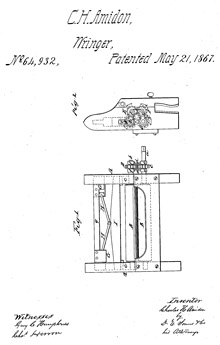 In the description Amidon points out the most important
feature as follows:
In the description Amidon points out the most important
feature as follows:
"The nature of my invention
consists in so arranging a wringing machine having
rollers composed of or covered with rubber or similar
elastic material or compound impervious to water, as
that the roller, which yields or gives to the varying
bulk of articles that pass between it and the roller
with fixed bearing, may move perpendicularly without
strain upon the gearing which connects the rollers, and
without causing the least alteration in relative
positions of the gearing-wheels their immediate
neighbors, while at the same time, from the peculiar
construction of self-adjusting spring, the pressure of
the roller upon the clothes is kept so nearly uniform
during all degrees of elevation or depression of the
roller that it may be considered practically constant."
On December 31, 1868 the factory of Gunn & Amidon at
Cherry Rum Brook burned to
the ground.
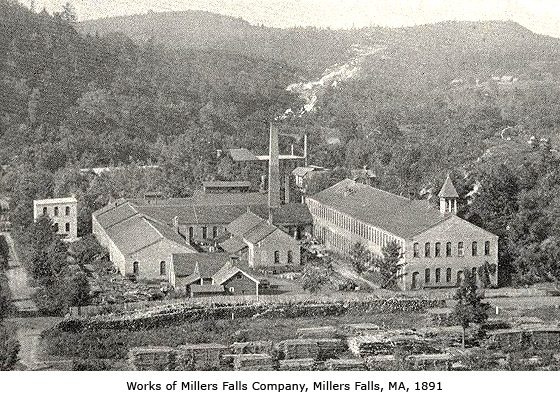
In 1892 the Greenfield Gazette, Centennial Edition published a
short review of Millers Falls Company, including rare
photographs of its facilities.
"The rapid growth of Millers Falls, which has made it one of the
prosperous villages of Franklin County, has been due almost
entirely to the Millers Falls company.
This company commenced business here in 1869. The promoters of
the enterprise were Levi J. Gunn; Charles H. Amidon and Henry L.
Pratt. Messrs. Gunn & Amidon had been engaged in the manufacture
of bit braces, wringers, etc., in Greenfield, and their factory
there was burned in 1868.
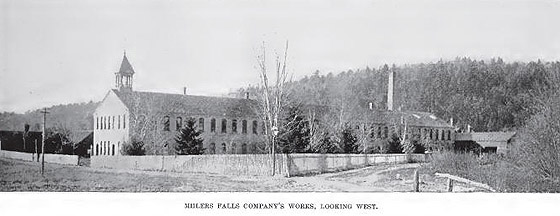
The water privilege and a considerable tract of land were
purchased at Millers Falls. The original shop was a one-story
brick building, 350 feet in length. There were also several
small out-buildings. The plant has been enlarged from time to
time, the shops now covering several acres, and having floor
space of 75,000 square feet.
The extent and capacity of the main buildings may be seen in the
accompanying illustrations. When a corporation was formed Mr.
Amidon withdrew, and is now located at Buffalo, N. Y. The
company was originally the Millers Falls Manufacturing Company,
but in 1874 it absorbed the Backus Vice Company and became the
Millers Falls Company. It has a capital stock of $200,000. The
factory gives employment to about 300 hands.
The goods manufactured are machinists' and household hardware,
beside many specialties. Leading lines are bit braces, breast
drills, angular borers, chucks of various kinds, hand drills,
automatic borers, angular drilling machines and various devices
for boring and drilling; anvil vises, machinists' and
wood-workers’ vises, jack-screws, Rogers, Lester, Goodell
companion and cricket scroll saws, family tool chests, saw
frames, carving tools, auger handles, hollow augers, family
grind-stones, soldering sets, wood and iron levels, glass
cutters, Crispin awls, screw drivers, hack and butcher saw
frames and blades, mitre boxes, mitre planers, wagon jacks,
nail-pullers, ratchet drills, wrenches, tool cabinets, and any
other articles which may be demanded by the trade.
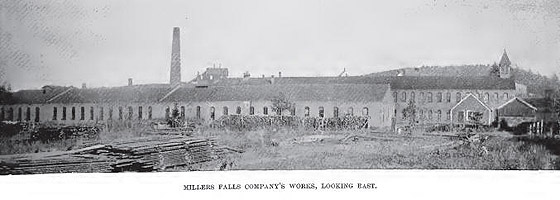
The goods are sold in all the markets of the world, no
inconsiderable portion of the out-put being required for
importation.
The business has been uniformly successful. The president of the
company, Henry L. Pratt is located at 93 Reade Street, New York,
where the company maintains a large warehouse. Levi J. Gunn has
been the company's treasurer from the start, and George E.
Rogers, the clerk, has held that position for several years.
Much of the success of the company is due to the good management
of these officials.
The following is the full list of officers: President, Henry L.
Pratt; treasurer, Levi J. Gunn; secretary, Geo. E. Rogers;
directors, Henry L. Pratt, Edward P. Stoughton, John L. Varick
and George Munson of New York, Levi J. Gunn, Chester C. Conant,
Geo. A. Arms, Edward E. Lyman and Geo. E. Rogers of Greenfield."